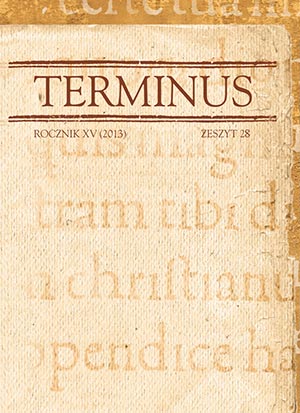Anegdoty o Demostenesie – wprowadzenie
The Anecdotes on Demosthenes – An Introduction
Author(s): Paulina PiotrowskaSubject(s): Literary Texts
Published by: Wydawnictwo Uniwersytetu Jagiellońskiego
Keywords: Demosthenes; anecdote; Renaissance biographies; doxography
Summary/Abstract: The following article is devoted to anecdotes on Demosthenes and consists of two parts. The first one is an introduction to the anecdotes themselves. Starting with a short biography of the pre-eminent Greek speaker, it discusses the rest of the content of a manuscript which clearly shows awakened interest in Antiquity. Consequently, the biography itself becomes a subject. Later the reception of Diogenes Laertius’s Lives and Opinions of Eminent Philosophers is briefly discussed, highlighting the influence and evolution of ancient authors and ancient thought on, among others, Poggio Bracciolini and Petrarch. Then the author some introductory remarks on Renaissance attempts to translate and exemplify a stylised biography of the philosopher in Polish tradition. One of these attempts was made by Filippo Buonaccorsi, called “Callimachus”, who composed the Life of Gregory of Sanok, the archbishop of Lviv. Finally, the author poses the question of why Demosthenes appeared as a character interesting both in terms of a biography and anecdotes. According to Turasiewicz, it seems that people were filled with the ideals of Athenian democracy and let themselves be somehow charmed by the eloquence of Demosthenes. This did not happen through flattery but through honesty and clarity of thought and due to the idea of a kind of sacrifice entailed in the orator’s speeches. An admiration for the speaker’s political views was reflected not only in a golden wreath but mainly in the silent approval of the struggle for political sovereignty at the expense of “money, pleasure and life.” The wise people of Athens accepted without objection reprimand and instructions uttered by the speaker, but they did it only because it was honest criticism supported by reasonable arguments. With the fall of Constantinople, the works of Demosthenes returned to Europe and thanks to Byzantine scholars he found Ostroróg, Georges Clemenceau, Friedrich Nietzsche – these are just a few of the important people who found themselves influenced by him. The introductory notes are followed by the second part of the paper, which consists of a translation of the anecdotes. Enriched with necessary footnotes, the translation attempts to provide an interesting insight into Demosthenes’ personality, since one might find there not only stories praising his qualities but also some anecdotes on his faults. All in all, the reader is left with a thorough, though not comprehensive, image of the famous Athenian orator.
Journal: TERMINUS
- Issue Year: 15/2013
- Issue No: 3 (28)
- Page Range: 419-443
- Page Count: 17
- Language: Polish

